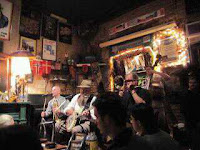If A Tree Falls In A Forest...

MUSIC??? Do ink blots on a piece of paper constitute music? No, printed musical notation is simply a plan, or blue print, that allows musicians to communicate musical ideas to each other. What each individual musician does with those general musical ideas can be significantly different. Music is a dramatic structure. It is up to the performer to tell a musical story. The performer must engage the listener in the drama just as the author of a novel must engage his readers. The musicians job is to look for musical events and effects that will do just that.



